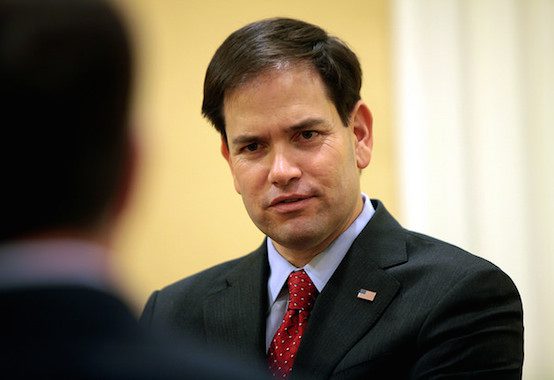The 2016 Field and the Weakness of the “Establishment” Candidates

Jeet Heer makes a familiar argument about the Republican field:
Douthat explicitly draws the analogy with Romney, suggesting that the GOP will settle for Rubio just as it entered into a largely loveless marriage with the former Massachusetts governor. The problem with this analogy is that both McCain and Romney were more substantial figures than Rubio: They could flash not just impressive resumes (McCain as war hero, Romney as governor and business leader), but also a genuine popularity with large constituencies in the GOP. Romney never sank below 20 percent in the polls in 2012, a figure Rubio has yet to even remotely touch.
Romney had the advantage in 2011-12 of being the only “establishment” candidate in the race, so he was always going to be in a stronger position than any of the four candidates that still fit that description. The pattern in Republican nomination contests since at least 2000 is that there have always been many insurgents and usually only one or two “establishment” candidates in each cycle, and that has made it easier for the latter’s voters to consolidate behind one person sooner. The 2016 field hasn’t followed that pattern for several reasons. For one, there are simply too many candidates overall, and instead of lining up behind one “establishment” candidate these voters are split up among several. For another, there is no obvious “successor” from 2012 since there is no chance that party elites were ever going to rally behind Santorum or any of the other 2012 also-rans. Another problem for these candidates this year is that Trump is pulling away large numbers of moderate Republicans that have mostly favored them in the past, so some of the voters they would normally rely on aren’t as readily available. Meanwhile, instead of spreading their support out among too many candidates, conservative voters have mostly gravitated toward just two and have stuck with them. Thus the “outsiders” are dominating the field in the way that an “establishment” candidate usually does, and the “establishment” candidates are squabbling among themselves for the scraps.
One of the other main differences between Romney in 2011-12 and Rubio now is that Romney had already spent five or six years cultivating support for a presidential bid, including his first failed campaign in 2007-08. Romney didn’t win on his first attempt despite throwing large sums of money at the electorate and despite the deliberate effort of many movement conservatives to build him up as the preferred non-McCain candidate. By 2011, he had “paid his dues,” so to speak, and was the presumptive front-runner in part because he had. By contrast, Rubio has been touted as a top-tier candidate from the start without having done anything to demonstrate that he deserves that treatment, and he defends his candidacy explicitly as a repudiation of the idea that a politician should have to “pay his dues” before receiving the nomination. Rubio hasn’t made anything close to the same effort as Romney did in his first campaign, so it shouldn’t be surprising that that Rubio is doing worse in all respects than Romney was in his first campaign at this point in the race.
In order to believe that Rubio is in any sense the Republican front-runner, we would have to dispense with every objective measure of political support for presidential candidates. Saying that a candidate trailing several others in money, endorsements, campaign organization, and polling is the “real” front-runner defies both common sense and experience. I suppose it’s possible that every other candidate could fail and leave Rubio as the winner by default, but if a scenario requires so many things to break the right way for one candidate it’s not very likely.
Comments